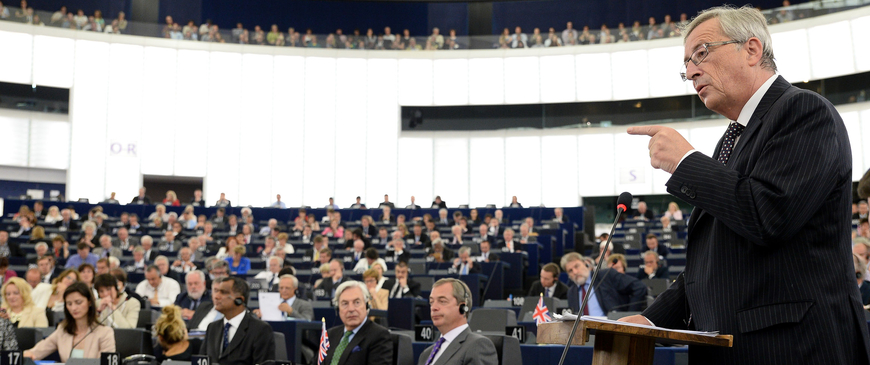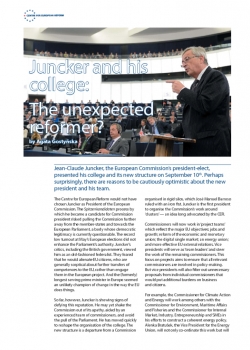
Juncker and his college: The unexpected reformer?
Jean-Claude Juncker, the European Commission’s president-elect, presented his college and its new structure on September 10th. Perhaps surprisingly, there are reasons to be cautiously optimistic about the new president and his team.
The Centre for European Reform would not have chosen Juncker as President of the European Commission. The Spitzenkandidaten process by which he became a candidate for Commission president risked pulling the Commission further away from the member-states and towards the European Parliament, a body whose democratic legitimacy is currently questionable. The record low turnout at May’s European elections did not enhance the Parliament’s authority. Juncker’s critics, including the British government, viewed him as an old-fashioned federalist. They feared that he would alienate EU citizens, who are generally sceptical about further transfers of competences to the EU, rather than engage them in the European project. And the (formerly) longest serving prime minister in Europe seemed an unlikely champion of change in the way the EU does things.
So far, however, Juncker is showing signs of defying this reputation. He may yet shake the Commission out of its apathy, aided by an experienced team of commissioners, and avoid the pull of the Parliament. He has moved quickly to reshape the organisation of the college. The new structure is a departure from a Commission organised in rigid silos, which José Manuel Barroso ruled with an iron fist. Juncker is the first president to organise the Commission’s work around ‘clusters’ — an idea long advocated by the CER.
Commissioners will now work in ‘project teams’ which reflect the major EU objectives: jobs and growth; reform of the economic and monetary union; the digital single market; an energy union; and more effective EU external relations. Vice presidents will serve as ‘team leaders’ and steer the work of the remaining commissioners. This focus on projects aims to ensure that all relevant commissioners are involved in policy-making. But vice presidents will also filter out unnecessary proposals from individual commissioners that would put additional burdens on business
and citizens.
For example, the Commissioner for Climate Action and Energy will work among others with the Commissioner for Environment, Maritime Affairs and Fisheries and the Commissioner for Internal Market, Industry, Entrepreneurship and SMEs in his efforts to construct a coherent energy policy. Alenka Bratušek, the Vice President for the Energy Union, will not only co-ordinate this work but will also decide which of her team’s activities need to be discussed by the whole college.
Smaller and newer member-states have always opposed grouping commissioners in this way. They have feared that it would create second-class commissioners and that they would struggle to get a senior portfolio. But Juncker cleverly recruited six of his seven vice presidents from newer or smaller member-states (Bulgaria,
Estonia, Finland, Latvia, the Netherlands and Slovenia). The large member-states were not left empty-handed either: the UK and France received the portfolios they asked for while Germany made sure that the key economic vice presidents were advocates of austerity.
But a decentralised Commission based on clusters may have drawbacks: if not managed properly, it could paralyse rather than improve the Commission’s work. A less presidential Commission may be more vulnerable to personal animosities and clashes of competences, especially if some vice presidents turn out to be less qualified than those they will be managing. Bratušek, the former Slovenian prime minister and now commissioner-designate, is subject to heavy criticism at home for nominating herself to the position even though her party lost in parliamentary elections. The controversies around her candidacy may weaken her credibility in the eyes of the commissioners she will supervise. Overly dominant personalities could also cause problems. Vice presidents should be careful not to destroy team spirit among the commissioners under them by exerting too much of their authority. If Juncker wants to go down in history as the president who not only formed clusters but also made them work, he must show himself to be a good manager too.
On Juncker’s side is the fact that many member-states have sent political heavyweights to Brussels this time. Five of the new college members have served as prime ministers and four as deputy prime ministers. Their political experience should give more clout to the Commission and help it to perform its executive functions, but will not guarantee success on its own.
If the EU’s legislative process is to work, Juncker will have to keep the European Parliament happy, as well as the member-states. The Council of Ministers and the European Parliament co-decide on most of the EU dossiers. To gain the support of an absolute majority in the Parliament, Juncker had to tweak his initial ‘electoral programme’ to satisfy not only the Christian Democrats but also the European Socialists and the Liberals. Only after that did the Parliament vote him into the presidency and now it will try to ensure that Juncker delivers on his promises. MEPs will also set out their expectations of the rest of Juncker’s team during public hearings due to start on September 29th. They will spend the next five years trying to influence the Commission’s activities.
Many of the problems facing Europe require prompt action at the EU level. But citizens worry that the EU regulates too many aspects of their everyday lives, instead of helping Europe out of recession and onto the path of greater prosperity. Junker’s ability to address their concerns may at times be difficult to reconcile with the Parliament’s appetite for expanding its legislative and scrutiny powers. This will be a balancing act for a president elected on the basis of the Spitzenkandidaten process.
This may be why Juncker asked Frans Timmermans to be his right-hand man and first vice president responsible for better regulation, inter-institutional affairs, the rule of law and the Charter of Fundamental Rights. Timmermans is a well-known supporter of the involvement of national parliaments in EU decision-making, an idea which is gaining support in more and more European capitals. He is likely to reach out to member-states’ legislatures, seeking to counterbalance both the power of national governments and of the European Parliament. Without provoking inter-institutional wrangling, he will aim to restore the Commission’s equidistance between national capitals and the Parliament. This could strengthen the Commission’s role as agenda-setter, which has been in decline since Jacques Delors’ presidency.
Juncker understands that his own political fate depends to a great extent on whether he can turn the Commission into a vehicle for reforming the EU. If he can use the clusters system to get commissioners and senior Commission officials working together; keep MEPs involved in the decision-making process without allowing them to dominate it; and find a way to reduce the distance between European citizens and the Commission that acts for their benefit, he will have proved his critics wrong. He has taken some important first steps.
Agata Gostyńska is a research fellow at the Centre for European Reform.

